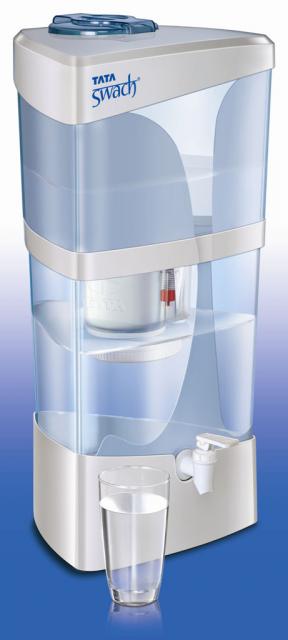Tata Chemicals is challenging Unilever’s India unit for the world lowest cost home water purifier, based on a rice husk ash filter. With a starting retail price of $16 for the unit, it costs less than half of Hindustan Unilever‘s breakthrough PureIt unit which has been a runaway success in India with $40 million in sales and three million units delivered already. The replacable filter for the Tata unit costs $6.

Tata’s Rallis Kisan Sansar and Tata salt’s distrbution network will distrbute the product.Built around a bulb-like water purifier made of rice husk ash filled with nano-silver particles, the Tata “Swach” can function without electric power or running water. The cartridge bulb has a purification medium that kills bacteria and disease causing organisms. It can purify up to 3,000 litres of water, after which the cartridge stops water flow. Fifteen patents have been filed for the technology and product. The filter was designed in a Tata Consultancy Services lab in Pune, while the silver nanotechnology was added by Tata Chemicals. Titan, Tata’s watch subsidiary, made the precision machine tools to manufacture the filter. Pune based Design Directions Private Limited provided industrial design services.Among the features of Swach which Design Directions added was pattern of the upper chamber which will facilitate manual cleaning,and the stackability’ of the two chambers which reduced the height of the box used for packaging (this makes it possible to fit one inside the other ensures that more packs can be carried in one truck). The current model doesn’t neutralize some contaminants such as arsenic.

Initial production will be one million units a year from a Tata Chemicals plant in Haldia, West Bengal, with a planned ramp-up to three million units annually within five years.
Safe clean water is in dire shortage in India and other developing countries. Without it disease is rampant: typhoid, cholera, jaundice and diarrhoea (which will kill about 380,000 children in India alone this year). Almost 80 per cent of diseases in developing countries are associated with water, causing some 3 million early deaths. Tata expects to sell this unit in Africa and other parts of the world eventually.



